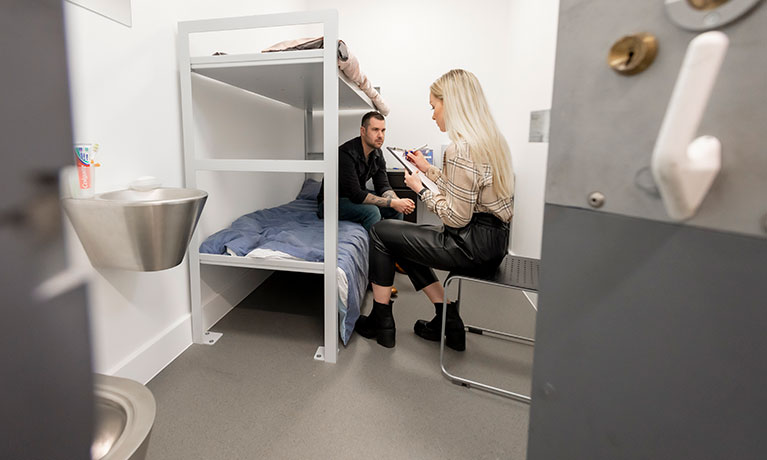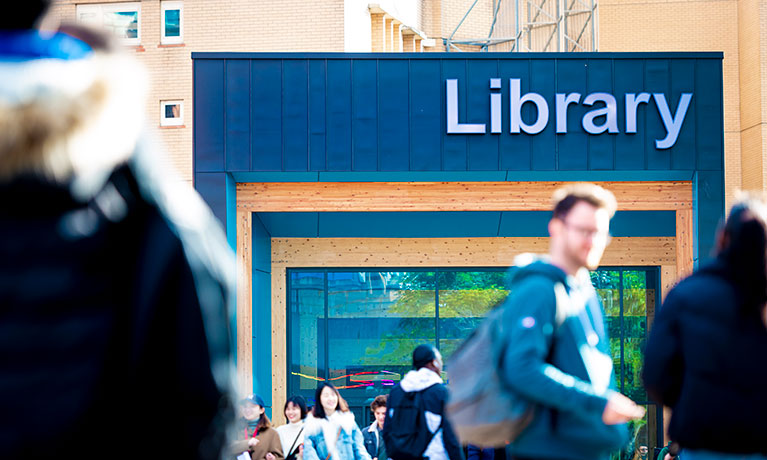Search
Criminology and Law BA (Hons)
Study level: Undergraduate
Explore crime, its causes, societal impact and criminal law, and equip yourself with the knowledge and skills needed for a career within the criminal justice system, both nationally and internationally.
Course option
Year of entry
Location
Coventry University (Coventry)
Study mode
Full-time
Sandwich
Duration
3 years full-time
4 years sandwich
UCAS codes
M930
Start date
September 2026
Course overview
Bridge the gap between theory and practice, applying legal and criminological frameworks to real-world challenges. With a focus on rigorous analysis and evaluation, you’ll explore developments within the legal system and learn how to address crime management.
- Modern curriculum: promotes the development of forward-thinking strategies to address current challenges such as cybercrime and criminal justice reform, allowing you to gain the analytical skills needed to navigate the rapidly changing landscape of crime and justice.
- Industry-focused learning: analyse and evaluate a range of topics and recent developments concerning the legal system in England and Wales and the management of crime at both local and global levels.
- Real-world learning: our mock courtroom allows you to take on a range of legal roles during teaching, helping you to develop the practical skills needed for future roles in criminal justice.4
Rated Gold Overall
Teaching Excellence Framework (TEF) 20235 QS Stars for Teaching and Facilities
QS Stars University RatingsTop 5 Student City in England (Coventry)
QS Best Student Cities Index 2025Why you should study this course
- Project-based learning: actively engage in real-world, meaningful projects. Work on complex problems, create tangible solutions and develop essential skills such as critical thinking, collaboration and communication. Assessment is designed to replicate the work and tasks carried out by criminology and law graduates, allowing you to showcase your expertise and real-world readiness.
- Contemporary issues: course content covers a range of areas within criminology, such as victimology, criminal justice, law and advocacy.
- Academic and industry insights: You will have the opportunity to attend lectures/events led by expert speakers from agencies involved in criminal justice.2 Their insights should help provide further context on how you can apply the knowledge and skills you gain throughout the course.
- Global perspective: get a global perspective of crime and compare different methods and ideologies regarding crime prevention, management and justice.
- Build your experience: take part in authentic simulations to enhance the study of penal methods of punishment.
What you'll study
We regularly review our course content, to make it relevant and current for the benefit of our students. For these reasons, course modules may be updated.
How you'll learn
Learn through hands-on activities and real-world examples, using the same approaches professionals use in the field. It’s all about helping you build the skills you need to feel confident and prepared for your future career.
Teaching methods may include:
- interactive lectures that may be delivered online or face-to-face
- seminars involving smaller groups working on problems or holding discussions and debates about issues arising in the lectures
- workshops involving a combination of content delivery and group work
- working together on projects to help develop critical skills such as problem-solving, teamwork and creative thinking
- simulations, enabling you to apply theoretical knowledge to practical scenarios.
Teaching contact hours
As a full-time undergraduate student, you will study modules totalling 120 credits each academic year. You will normally study one 30-credit module at a time. A typical 30-credit module requires a total of 300 hours of study made up of teaching contact hours, guided and independent study.
Teaching hours
Teaching hours may vary depending on your year of study and selected modules. During your first year, you can expect 12-15 teaching hours each week. You will also have the option to attend additional sessions, including time with a progress coach or to meet with staff for advice and feedback. As you progress through your studies, teaching hours may reduce.
Guided and independent study
Throughout your studies, you will be expected to spend time in guided and independent study to make up the required study hours per module. You’ll be digging deeper into topics, review what you’ve learned and complete assignments. This can be completed around your personal commitments. As you progress through your studies, you’ll spend more time in independent study.
Online learning
As an innovative university, we use different teaching methods including online tools and emerging technologies. So, some of your teaching hours and assessments may be delivered online.
Assessment
This course incorporates new and innovative assessment methods aligned with current industry standards, providing you with practical, real-world skills designed to advance your professional readiness and career prospects.
Assessment methods may include:
- writing exercises such as essays, reports, policy reviews and briefings
- live simulations and reflective journals about them
- group and individual presentations
- posters and infographics
- problem-solving scenarios such as case studies
- podcasts, academic posters and vlogs.
The Coventry University Group assessment strategy ensures that our courses are fairly assessed and allows us to monitor student progression towards the intended learning outcomes.
International experience opportunities
Emphasising inter-cultural awareness in all our students, the course content situates issues in a global context. It offers the opportunity for international experience through collaborative international online learning projects where students work on a task jointly with students from an institution abroad. Study abroad forms part of the optional sandwich year which students normally take after successful completion of their second year2. For more information, please go to the fees and funding section.
Please note that all international experience opportunities may be subject to additional costs, competitive application, availability, and meeting applicable visa and travel requirements, and are therefore not guaranteed2.
Entry requirements
Typical entry requirements:
Not got the required grades? We offer this degree with an integrated foundation year.
Fees and funding
| Student | Full-time | Part-time |
|---|---|---|
| UK, Ireland*, Channel Islands or Isle of Man | 2026/27 fees TBC 2025/26 fees: £9,535 per year |
Not available |
| EU | 2026/27 fees TBC 2025/26 fees: £9,535 per year with EU Support Bursary** 2026/27 fees TBC 2025/26 fees: £16,800 per year without EU Support Bursary** |
Not available |
| International | 2026/27 fees TBC 2025/26 fees: £16,800 per year |
Not available |
If you choose to study this course with a professional placement2 or study abroad year, you will need to pay a tuition fee3 to cover your academic support throughout your placement year. Students commencing their professional placement in the academic year 2027/28 will pay £1,500 if they are paying UK fees, or £1,800 if they are paying international fees.
For advice and guidance on tuition fees and student loans visit our Undergraduate Finance page and see The University’s Tuition Fee and Refund Terms and Conditions.
The University will charge the tuition fees that are stated in the above table for the first Academic Year of study. The University will review tuition fees each year. For UK (home) students, if Parliament permits an increase in tuition fees, the university may increase fees for each subsequent year of study in line with any such changes. Note that any increase is expected to be in line with inflation.
If you choose to study this course with a professional placement, the University will charge the tuition fees stated above for those on a placement during Academic Year 2027/28. The University will review professional placement tuition fees each year. For UK (home) students, the University may increase fees for each subsequent year of study, but such that it will be no more than 5% above inflation.
For international students, we may increase fees each year, but such increases will be no more than 5% above inflation. If you defer your course start date or have to extend your studies beyond the normal duration of the course (e.g. to repeat a year or resit examinations) the University reserves the right to charge you fees at a higher rate and/or in accordance with any legislative changes during the additional period of study.
We offer a range of International scholarships to students all over the world. For more information, visit our International Scholarships page.
Tuition fees cover the cost of your teaching, assessments, facilities and support services. There may be additional costs not covered by this fee such as accommodation and living costs, recommended reading books, stationery, printing and re-assessments should you need them. Find out what's included in your tuition costs.
The following are additional costs not included in the tuition fees:
- Any optional overseas field trips or visits: £400+ per trip.
- Any costs associated with securing, attending or completing a placement (whether in the UK or abroad).
*Irish student fees
The rights of Irish residents to study in the UK are preserved under the Common Travel Area arrangement. If you are an Irish student and meet the residency criteria, you can study in England, pay the same level of tuition fees as English students and utilise the Tuition Fee Loan.
**EU Support Bursary
Following the UK's exit from the European Union, we are offering financial support to all eligible EU students who wish to study an undergraduate or a postgraduate degree with us full-time. This bursary will be used to offset the cost of your tuition fees to bring them in line with that of UK students. Students studying a degree with a foundation year with us are not eligible for the bursary.
Facilities
Teaching and learning take place in modern facilities on the main Coventry University campus near to the University Hub, Students Union and library4. Extensive use is made of seminar and workshop rooms for smaller groups to facilitate active group learning.
Facilities are subject to availability. Access to some facilities (including some teaching and learning spaces) may vary from those advertised and/or may have reduced availability or restrictions where the university is following public authority guidance, decisions or orders.

Prison cells
Two prison cells, one single and one double, are in the Richard Crossman Building on main campus and used to give a sense of the real-life experiences of inmates, and for role play learning.

Library
Our dedicated subject librarian on main campus will provide guidance on searching and retrieving academic sources using the library systems and databases, as well as assistance and support with individual enquiries.

Centre for Academic Writing
The Centre for Academic Writing next to the Library will offer individual advice on developing writing skills or dealing with writing problems.
Careers and opportunities
Throughout the course, you should develop a broad range of highly valued skills to reflect the changing and dynamic needs of industry, including exceptional communication, project planning, critical thinking and analysis, problem-solving, and powerful presentation and listening skills.
On successful completion of the course, you should be a globally and interculturally aware graduate ready to make a dynamic difference in the world. You could find yourself working in the following roles and areas:
- Solicitor (law graduates can now qualify through the new Solicitors Qualifying Examination (SQE) training route which requires further study)
- Criminal justice policy officer
- Legal executive
- Witness support officer
- Advocacy, campaigns or legal advice officer for a charity
- Corporate social responsibility advisor
- Police (including specialist units like victim or witness liaison)
- Criminal justice policy officer.
Where our graduates work
Previous graduates have gone on to pursue postgraduate qualifications and work for a range of organisations, including The National Crime Agency, the Independent Police Complaints Commission, HM Prison Service, Coventry Cyrenians, West Midlands Police and the Metropolitan Police.
Further study
Progression routes to courses for further study within Coventry University include:

Discover Phoenix+
Phoenix+ brings you together with other students to learn, experience and develop essential knowledge and skills. Whatever destination you choose, it's about preparing you for life after university.
Learn more about Phoenix+How to apply
You may also like

Criminology BA (Hons)

Criminology and Psychology BA (Hons)






